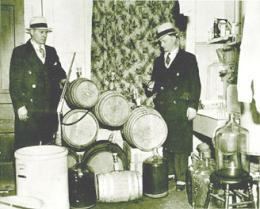Drug Prohibition: A Case Study
 Alcohol became illegal under US federal law in 1919. Supporters saw it as a chance to "clean up" America. They imagined a country full of productive, happy citizens without the eyesores of homeless people begging spare change intended for the purchase of alcoholic beverages. And for a time, it worked. Alcohol consumption plummeted in the early twenties. Surprisingly, however, it began to climb quite rapidly towards the end of that decade, finally reaching levels that nearly matched its use prior to prohibition! Alcohol became illegal under US federal law in 1919. Supporters saw it as a chance to "clean up" America. They imagined a country full of productive, happy citizens without the eyesores of homeless people begging spare change intended for the purchase of alcoholic beverages. And for a time, it worked. Alcohol consumption plummeted in the early twenties. Surprisingly, however, it began to climb quite rapidly towards the end of that decade, finally reaching levels that nearly matched its use prior to prohibition!
Unlike the government-regulated liquor that Americans had been consuming prior to prohibition, however, the home-brewed "moonshine" was much more dangerous, resulting in vastly increased health risks for users. In addition, alcohol users were forced to pay black-market prices for their drink, which moved that portion of the economy underground, where it couldn't be taxed. And it was hardly surprising when the market began to attract organized crime, who terrorized cities with their gang wars and led to the rise of the most notorious gangster of all time, Al Capone.
Many other negative effects came along with prohibition. Previously, alcohol was much harder to come by for minors, but now that it was equally illegal for everyone, the average age of drinkers grew much younger. (This trend reversed after prohibition was repealed.) Jails swelled with moonshine brewers and drinkers. Crime, such as burglary and assault, increased noticeably, another trend that reversed itself after the repeal.
 Towards the end of the twenties, a growing anti-prohibition movement began to lobby for their right to consume alcohol. At first, their position was immensely unpopular. With time it came to be supported by Democratic Presidential nominee, Franklin Roosevelt. Prohibition was finally repealed in 1933. Towards the end of the twenties, a growing anti-prohibition movement began to lobby for their right to consume alcohol. At first, their position was immensely unpopular. With time it came to be supported by Democratic Presidential nominee, Franklin Roosevelt. Prohibition was finally repealed in 1933.
Obvious Metaphors
The parallel to today's drug prohibition is easy to see. Why this apparent duality? Alcohol is a dangerous and habit-forming drug that would be right at home as a Schedule I narcotic. Shouldn't the anti-drug movement consider the outlawing of alcohol to be a #1 priority? They aren't, because it's a proven fact that alcohol prohibition doesn't work. And as we are learning now, neither does the prohibition of any other drug.
Why an Amendment?
Alcohol was made illegal in the United States by an Amendment to our Bill of Rights. Why such an extreme legislative measure, while drugs outlawed more recently have only been regular non-Amendment laws? The answer was that, at that time, there was no War on Drugs to cloud the issue, and lawmakers were aware of the fact that passing laws which outlaw substance use were entirely unconstitutional. That's why they passed it as an Amendment: Amendment are, by definition, extensions of the Constitution. (In fact, another Amendment was later required to repeal alcohol prohibition.)
Lawmakers today feel free to pass laws limiting substance abuse despite the fact that it is quite clearly a violation both of the First Amendment and the spirit in which the United States was born, in which all persons were entitled to "certain inalienable Rights, that among these are Life, Liberty, and the pursuit of Happiness."
|

